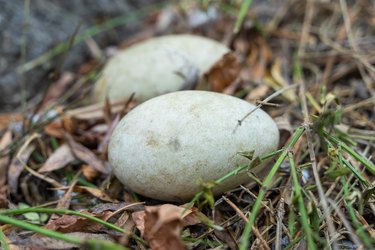The gestation period of geese is 28 to 30 days. The female goose stays with the nest until the goslings hatch, and she continues to protect her young after they hatch. If you are breeding geese, there is no need to use a goose egg incubator.

The gestation period of geese
It takes about 28 to 30 days after the last egg is laid for geese eggs to hatch. Eggs from larger species of geese may take as long as 35 days. A goose lays eggs early in the morning and may lay eggs for several days before she goes broody. This means that she stops laying and starts to incubate and care for her eggs.
Video of the Day
Video of the Day
The number of eggs she lays varies. Canadian geese in the wild typically lay four to nine eggs. Other types of geese may lay a clutch of 12 to 15 eggs. While it takes several days for geese to lay the full clutch of eggs, the development of the eggs is stalled until the goose starts incubating the eggs. This helps ensure the eggs develop at the same time, but it can still take one to three days for all of the eggs to hatch after the incubation period.
Incubation of goose eggs
Wild Canadian geese create a nest on the ground in view of the water. They will often return to this nesting site each year. Male geese, also called ganders, are attentive parents and will stand guard nearby. The best survival rate of goslings occurs when the female goose incubates her eggs herself. If you are running a breeding business, you can also consider giving the eggs to another bird, such as hens, Muscovy ducks, or turkeys.
This will ensure an ideal incubation environment for the eggs while encouraging the goose to continue to lay eggs for a longer period of time. Since these birds aren't typically large enough to move the eggs, you will need to rotate the eggs by hand each day if you choose this method of incubation.
Goose egg incubator
If you do opt to use a goose egg incubator, select one designed for geese if possible, as they have different needs than other bird eggs. Set the temperature to 99.5 degrees and the humidity level to 50 to 55 percent. After the 27th day, increase the humidity to 75 percent until the goslings hatch.
Lay goose eggs horizontally in the incubator and rotate them 180 degrees as many as four times per day. Consider marking the eggs to help you rotate them accurately.
Goose breeding considerations
Geese start to lay eggs in the early spring and can continue through the summer months if they don't incubate their own eggs and raise their own goslings. Hens typically lay early in the morning, but if you are incubating the eggs in an incubator or giving them to another bird to incubate, be sure to check for eggs throughout the day.
If you are raising geese yourself, it is important to consider the ratio of male and female geese. You can keep a pair of geese — one male and one female — successfully. However, if you have a larger flock, aim to have one male goose for every three to four hens.
- Geese Relief: Canadian Geese Breeding Season
- New South Wales Department of Primary Industries: Egg Production, Incubation and Sex Identification of Geese
- The Humane Society of the United States: Canada Goose Egg Addling Protocol
- Incubators.org: Goose Egg Incubation
- Metzer Farms: Frequently Asked Questions